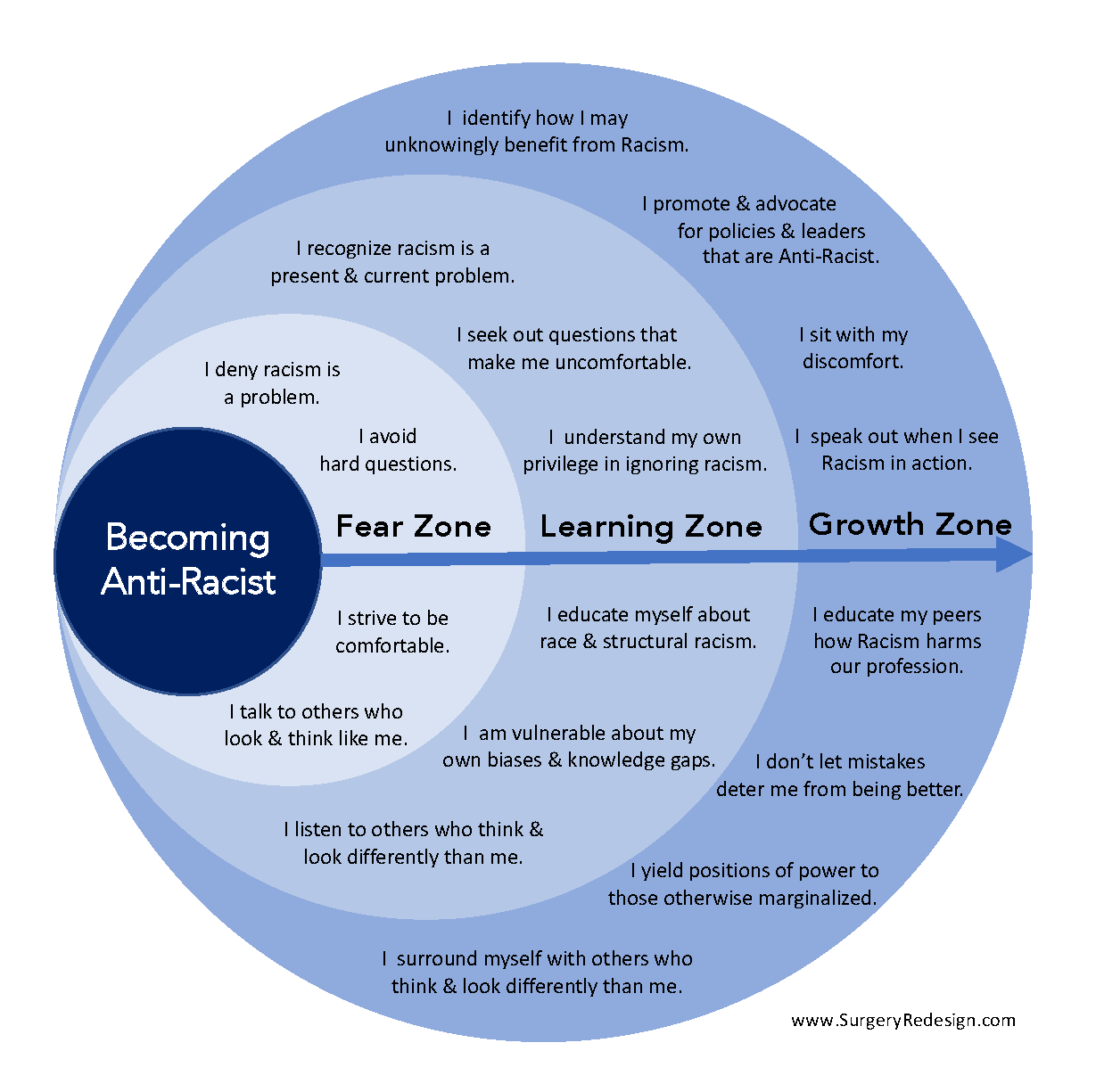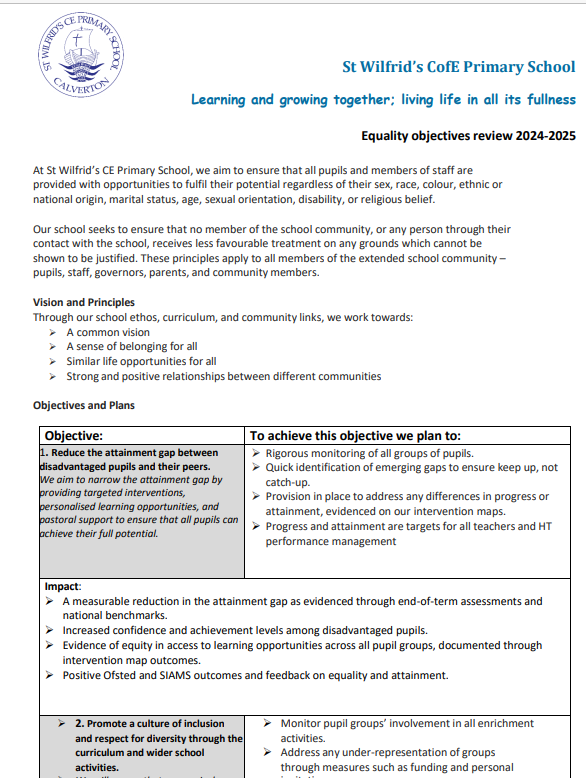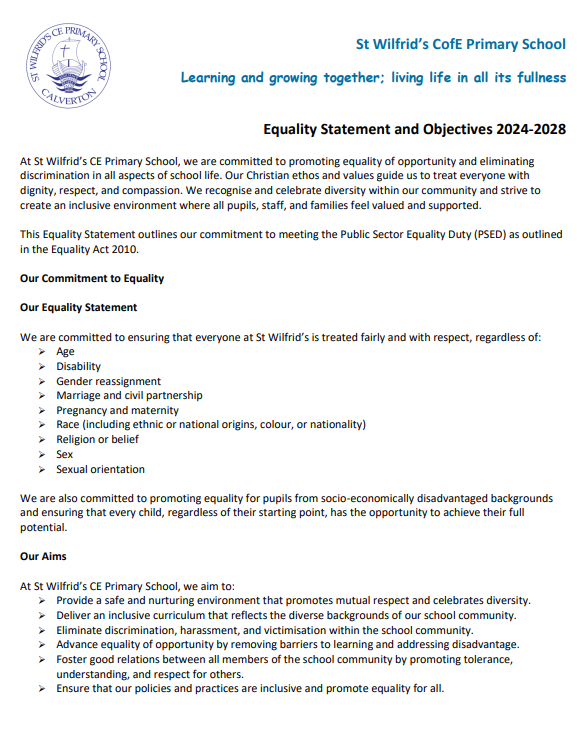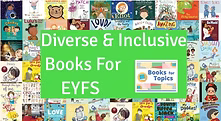Diversity, Equity, Inclusion and Belonging
We value every member of the St Wilfrid’s Community: our children, their families, our staff and governors and, as such, we want to celebrate everyone’s unique identity whilst ensuring we have a true sense of belonging.
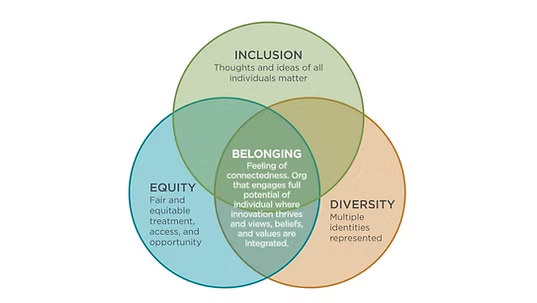
We are committed to working on our DEIB targets, putting DEIB at the heart of our curriculum so that everyone feels represented, valued and empowered. We aim to equip all our community with the knowledge to understand and value people with protected characteristics. Our school values of kindness, love, respect, faith, resilience and joy will support our drive to create a community that allows all to thrive and succeed, and have a true sense of belonging whilst retaining their own individuality.
Under the Equality Act 2010, we welcome our general duty to
- Eliminate unlawful discrimination, harassment and victimisation and any other conduct prohibited by The Equality Act 2010
- Advance equality of opportunity between people who share a protected characteristic and people who do not share it.
- Foster good relations between people who share a protected characteristic and people who do not share it.
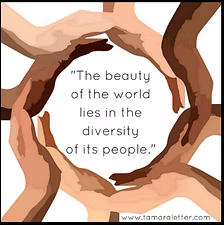
Here's a comprehensive Equality Statement 2024-25 for St Wilfrid's CE Primary School, including the school's equality objectives and in line with UK statutory requirements:
Equality Statement 2024-2025
St Wilfrid's CE Primary School
At St Wilfrid’s CE Primary School, we are committed to promoting equality of opportunity and eliminating discrimination in all aspects of school life. Our Christian ethos and values guide us to treat everyone with dignity, respect, and compassion. We recognise and celebrate diversity within our community and strive to create an inclusive environment where all pupils, staff, and families feel valued and supported.
This Equality Statement outlines our commitment to meeting the Public Sector Equality Duty (PSED) as outlined in the Equality Act 2010.
Our Commitment to Equality: Equality Statement and Objectives and Annual Equality Impact Report.
For further information or to discuss our approach to equality and inclusion, please contact:
Miss Cousin via the school office.
Protected Characteristics
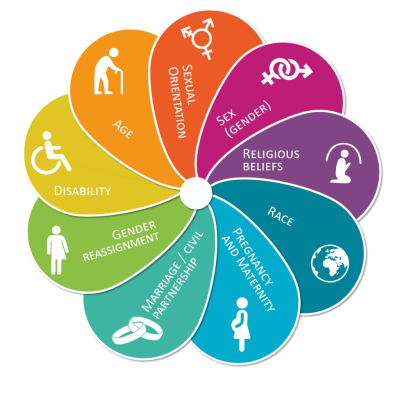
PROMOTING THE NINE PROTECTED CHARACTERISITICS
The Equality Act became law in 2010. It covers everyone in Britain and protects people from discrimination, harassment and victimisation. Everyone in Britain is protected. This is because the Equality Act protects people against discrimination because of the protected characteristics that we all have. Under the Equality Act, there are nine Protected Characteristics:
- Age
- Disability
- Gender reassignment
- Race
- Religion or belief
- Marriage or civil partnership
- Sex
- Sexual orientation
- Pregnancy and maternity
Under the Equality Act you are protected from discrimination:
- When you are in the workplace
- When you use public services like healthcare (for example, visiting your doctor or local hospital) or education (for example, at your school or college)
- When you use businesses and other organisations that provide services and goods (like shops, restaurants, and cinemas)
- When you use transport
- When you join a club or association (for example, your local tennis club)
- When you have contact with public bodies like your local council or government departments
The 9 Protected Characteristics are actively promoted in school through:
- Our school SDP and SEF
- Our school core values
- Our school behaviour policy
- Conscious role modelling by all adults in the school community
- Active engagement and communication with parents and carers
- Assemblies
- British Values themes which are threaded through our curriculum
- Discussion within curriculum subjects, taking a cross-curricular approach
- Promoting articulation by building appropriate language and a coherent vocabulary
- Personal, Social, Health and Economic education (PSHE) sessions
- Religious Education (RE) lessons, RSE lessons and Protected Characteristic talks
- Sporting, Art and Cultural Events
- Pupil Voice
- Educational visits
- Real-life learning outside the classroom
- Guest speakers
- Developing links with local, national and international communities
- Extra-curricular activities, after-school clubs, charity work and work within the local community
- Diversity Champions
Embedding Protected Characteristics into the whole ethos of Archbishop Cranmer Academy, promotes:
- Self-esteem, self-knowledge and self-confidence
- Respect for democracy and support for participation in the democratic process
- Acceptance of responsibility for their own behaviour
- Respect for their own and other cultures
- Understanding of how they can contribute positively to school and home life and to the lives of those living and working in the locality and further afield
- An understanding of Equality, Human Rights and Protected Characteristics
- An understanding of how citizens can influence decision-making through the democratic process
- An appreciation that living under the rule of law protects individual citizens and is essential for their wellbeing and safety
- An understanding that the freedom to choose and hold other faiths and beliefs is protected in law
- An acceptance that other people having different faiths or beliefs to oneself (or having none) should be accepted and tolerated, and should not be the cause of prejudicial or discriminatory behaviour
- An understanding of the importance of identifying and combating discrimination.
Diverse and Inclusive Books for EYFS
Diverse and Inclusive Books for KS1
Diverse and Inclusive Books for Y3 & 4
Diverse and Inclusive Books for Y5 & 6
Each year group has selected 6 texts to share in class. These support our children in learning about diversity and the protected characteristics through quality texts.
We have also added further texts on diversity to our curriculum through taking part in the AREP (Anti-racism education programme) this year.
